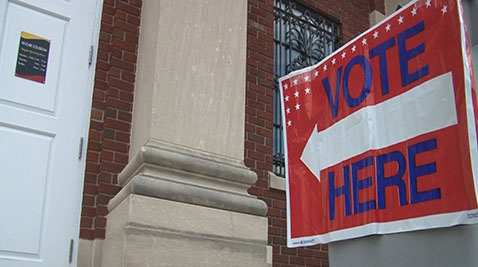A House-passed package overhauling voting, improving election security and reforming campaign finance laws is now in the Senate, where deep partisan divisions spell an uncertain fate for the landmark bill.
H.R. 1, also known as the For the People Act of 2021, is sponsored by Rep. John Sarbanes, D-Towson, and co-sponsored by every House Democrat. The measure passed the House March 3 on a 220-210 party-line vote.
Sarbanes wrote in a letter on his website that H.R. 1 was “a once-in-a-generation reform effort to protect and expand the right to vote, clean up corruption in Washington and restore trust, transparency and integrity in government.”
“Marylanders and Americans of all political stripes are demanding real change and accountability from their elected officials,” the congressman said. “People are deeply frustrated by the state of our political system – where voter suppression, extreme partisan gerrymandering and big, dark, special-interest money drown out the voices of ordinary Americans.”
Sarbanes’s bill focuses on three major areas: setting federal standards to make it easier to register to vote and to cast a ballot, expanding public financing of congressional campaigns and requiring greater transparency on donors, and increasing accountability for public officials.
The voting section of the act aims to institute automatic voter registration, put an end to partisan gerrymandering and enhance federal support for voting system security.
In terms of campaign financing, the Sarbanes bill would require all organizations involved in political activity to disclose large donors. It also would create a “multiple matching system for small donations,” paid for by a surcharge on government settlements with corporations and individuals found to have violated federal laws.
In its third section, the bill establishes tighter ethical standards for conflicts of interest in the executive branch, requires development of a code of ethics for justices on the Supreme Court, toughens foreign agents’ registrations and expands requirements for registering as a lobbyist.
Rep. Andrew Harris, R-Cockeysville, was among a host of Republican critics of the elections measure.
“This bill is a partisan attempt to overhaul elections, and a complete sellout to the swamp, as it will aid embedded politicians by using hard-earned taxpayer dollars to fuel political campaigns,” Harris said in a statement.
Still, over 150 grassroots organizations have endorsed the Sarbanes proposal.
The Declaration for American Democracy is a coalition representing a range of labor, racial justice, faith, women’s rights, and environmental organizations.
“For far too long, special interests, wealthy donors, and vote suppressors have dominated our politics and attempted to silence the voices of everyday Americans, especially in Black and Brown communities,” the group said in a memo. “The For the People Act would help shift power away from bad actors and transfer it to ‘we the people.’”
In pre-taped remarks on Sunday, President Joe Biden said the legislation “is urgently needed to protect the right to vote, the integrity of our elections, and to repair and strengthen our democracy.”
He added that he hopes the Senate “does its work” so he can sign the legislation into law.
That may be a tall order for supporters of the bill, which would require 60 votes for passage. Even if all 50 Senate Democrats embrace the measure, GOP opposition appears nearly unanimous at this point.
Senate Minority Leader Mitch McConnell, R-Kentucky, on Tuesday denounced the bill as an “effort to rewrite the ground rules of American elections and seize power from states and localities.”
“It’s quite the recipe for rebuilding public faith in our democracy on all sides — a purely partisan effort to seize unprecedented power for Washington D.C. on a razor-thin majority,” McConnell said on the Senate floor, “a hugely harmful idea at the worst possible time.”
H.R. 1 has yet to be scheduled on the Senate’s legislative calendar. But Democrats are divided over whether to attempt to abolish the filibuster, the 60-vote threshold for cutting off debate to pass major legislation. The filibuster may figure in the future of many House-passed bills facing Senate action – and Republican opposition.
“We’re going to figure out a way,” Senate Majority Leader Chuck Schumer, D-New York, said in a recent interview with Politico.
“It’s a passion of mine to get (election reform) done, when you see what they’re doing in the states to change voting rights,” Schumer said. “Everything’s on the table. We have to. What is not an option is not getting bold things done.”

